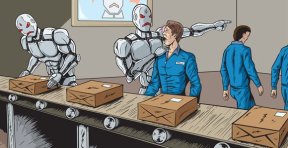President-elect Donald Trump will be swor n in on January 20th. One of his most popular campaign promises was to bring jobs back to the United States.
n in on January 20th. One of his most popular campaign promises was to bring jobs back to the United States.
Who doesn’t want more jobs? I know I do. Having a job is something we all want. There’s nothing more frustrating than wanting to work, but can’t because there’s no job available, or finding a job that barely pays your expenses.
So as we eagerly await the jobs that are supposed to come back to America, I start to wonder:
- What jobs are coming back?
- Where will these jobs be?
- How many jobs are coming back?
- What are the qualifications for these jobs?
We may not know the answer to these (and many other) important questions for quite some time, but there’s one thing I do know: No matter how many promises a person makes, there are millions of jobs that are never coming back.
Thanks to automation.
What is Automation?
Automation is defined as “the use of largely automatic equipment in a system of manufacturing or other production process. ”
While many of us look at other countries as the reason we’ve lost jobs here in the States, it’s not the only reason. Automation has taken the place of humans in many professions or will have a tremendous impact in the future. Here is a brief list of professions that have been impacted by automation:
- Bartenders
- Cashiers
- Accounting
- Driverless cars and trucks
- Assembly line workers
- Bank tellers
- Telephone customer service
- Fighter pilots (drones)
- Tax preparers
- Sanitation workers
- Financial advisors
These are just a few examples of how automation is already affecting us. I remember on trash day, there were three people on the truck: the driver and two men who picked up the trash cans and emptied them onto the back of the truck. Now, I only see one guy. The new garbage trucks have a mechanical arm that picks up the trash can and empties it for the driver.
What happened to the other two guys? Automation happened to them. They were no longer needed and laid off.
How Far Can Automation Go?
According to an article published in Mckinsley Quarterly, technologies could automate 45 percent of the activities people are paid to perform and that about 60 percent of all occupations could see 30 percent or more of their constituent activities automated.
This should make you think: if automation can take these many jobs, what will happen to the people who lose those jobs? How will they pay their bills and provide for theirr families? Could this happen to you?
As our society changes, we must accept the fact that automation is here to stay, and it may only increase. Jobs that we take for granted today may be gone tomorrow.
This also means jobs that are promised too return from overseas may eventually become automated as well.
Don’t Wait, Create.
Instead of waiting on a job or hoping we’re not eventually replaced by a robot, we must become proactive. It’s time we start looking at all the options we have available to us, and that also includes becoming self employed. It’s critical we find ways to provide a service that can’t be automated that can generate income. By becoming self employed, we have greater control over what happens to us, and can adapt to the uncertainty that surrounds us in today’s society.
Automation is here to stay. We can’t count on jobs coming back, because they may not be here for long. It’s time to take a serious look at becoming an entrepreneur and starting our own businesses.
Get more great tips in my upcoming new book Readi – Set Go! A Simple Guide to Establishing a Successful Small Business. Co-written with Jeffrey White

3 thoughts on “Is Automation Taking Our Jobs?”